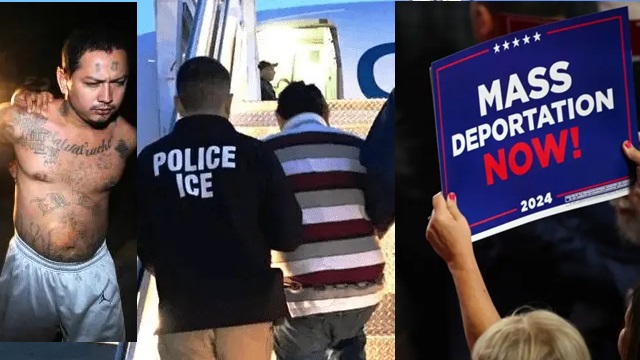 Mass Deportation Is the Priority in the Face of the Invasion of Illegals Into the USA
Mass Deportation Is the Priority in the Face of the Invasion of Illegals Into the USA
What To Expect From the Trump Administration’s Mass Deportation Plans
The severity of the massive and uncontrolled immigration crisis inherited from the Biden-Kamala regime has forced the Trump administration to prioritize mass deportation plans to crack down on the dangerous illegal immigration that has invaded the U.S.
The Department of Homeland Security, using data through 2022, estimated that there are 11 million undocumented people in the United States.
Experts project that the number of illegals has now risen to at least 12 million.
National security must be the top priority in the face of the massive illegal immigration and caravans that have invaded and intend to invade the U.S. before Trump assumes the presidency.
The first step is to detain and deport the criminals and rapists who are already on the books.
Tom Homan: "Undocumented immigrants who are deemed a threat to national security or public safety will be a priority for deportation."
He added that there are currently more than 1.5 million “convicted criminal aliens” in the U.S. with final orders of removal, whom they are going after, so these would be the first deportees of the new Trump administration. “There are thousands of gang members, illegal immigrant gang members that we're going to be looking for.
Next, we must identify and separate those who are not registered from those who are registered and have no criminal record and prosecute the illegals for subsequent deportation. Then, we will pursue comprehensive immigration reform.
Other solutions that deceptively seek to discredit deportation measures as a violation of the human rights of illegal immigrants and their families are political maneuvers to justify immigration chaos that affects national security.
Previous Policy Withdrawal
- Policy Change: The new administration intends to quickly reverse policies implemented during the Biden presidency, which focused on an approach that favored and encouraged illegal immigration. The new measures may eliminate temporary protections and programs that allow illegal immigrants to remain in the country to receive economic and social benefits.
- Declaration of Emergency and Use of the Military: The administration is expected to declare a national emergency to facilitate mass deportations. This would allow the use of military assets to assist in deportation operations, which has raised concerns among advocates for illegal immigrants.
- Executive Orders and Old Laws: The reinstatement of Trump's executive orders would imply a return to more stringent policies, ensuring border security, deportation, and the elimination of programs that facilitated and encouraged the uncontrolled entry of illegal immigrants. Activation of the Enemy Alien Act of 1798 would allow for the rapid deportation of unauthorized immigrants if they are deemed to pose a threat.
Challenges and Resistance
- Complications in Removal: The process of removing millions of unauthorized immigrants presents multiple logistical and legal challenges. Anticipated resistance from sanctuary states, which have adopted policies to protect immigrants, will further complicate these operations.
- Sanctuary Legal Position: Although federal law provides that agents may detain illegal immigrants, sanctuary cities and states have the legality to limit cooperation with federal authorities, creating an environment of tension between levels of government.
Resistance and Insubordination of Sanctuary Jurisdictions
- Blue States Rejection: State governments with pro-immigration policies, such as Massachusetts and Arizona, have stated that they will not use state resources to support deportations. This emphasizes local resistance to the protection of illegal immigrants by hindering federal law enforcement's efforts to identify, arrest and deport illegals.
- Opposition Actions: The possibility of police and citizen intervention to prevent federal officials from carrying out deportations adds additional complexity to implementing these policies.
- The insubordinate may be jailed: They will not be able to afford positions like that of Denver's Democratic mayor, Mike Johnston, who has vowed to mobilize police and residents “stationed at the county line” to “keep” federal immigration authorities “out” of the city.
Tom Homan, dubbed the incoming “border czar,” has already warned sanctuary city officials not to resist or impede the federal government's deportation activities. “It is a crime to harbor or deliberately hide an illegal immigrant from immigration authorities. Don't put us on trial,” Homan said.
I am “willing to put [Johnston] in jail,”, Homan said.
Deportation Focus and Statistics
- Identified Offenders: The administration plans to focus its efforts on deporting offenders who have already been identified by ICE, which could involve people with serious criminal convictions.
- ICE Statistics: According to ICE, more than 662,500 illegal immigrants have criminal records. Of these, more than 435,700 have been convicted of crimes and 226,800 face pending charges, highlighting the magnitude of the problem and the implications of the policies to be implemented.
Message to Immigrants and Strategy
- Outstanding Deportation Orders: Homan, a senior immigration official, emphasizes that those with deportation orders should be removed to deter illegal immigration. This stance is classified by open borders advocates as a “no tolerance” policy toward unauthorized entrants, regardless of the existing immigration laws being violated by the Biden-Kamala administration.
- Voluntary Return: The Trump administration is also considering strategies to persuade illegal immigrants to return to their home countries voluntarily, offering them the possibility of applying for legal entry visas after departure.
Use of Military Force and Laws
- Trump and the Military: Trump's suggestion to use the military in deportation operations has caused an uproar from those who promote and support illegal immigration and have questioned the legality of the president's power to implement it.
President Trump can declare a national emergency and use military resources to reverse the consequences of Biden's invasion of illegals through a massive deportation program.
Can the President Legally Use the Military To Execute Mass Deportations?
- It is completely legal for the president to use the military to help execute mass deportations and other immigration security actions. The National Guard, with the governor's approval, can detain or arrest individuals, while other branches of the military can provide logistical support.
- It is completely legal for the president to use the military to help execute mass deportations and other immigration security actions.
- The president has the executive power to deploy the military to assist with immigration issues, with legal limits on the role the military can play in these cases. For example, federal branches such as the U.S. Navy or Air Force cannot be used to detain people or make arrests on U.S. soil, but they can assist with security-related duties.
- The Posse Comitatus Act does not apply to the National Guard, as it is a state militia that the president can call up in cooperation with state governors. Trump's Truth Social post mentioned a declaration of a national emergency, but the president can request assistance from the National Guard or federal armed forces with or without declaring a national emergency.
- The Brennan Center for Justice explains that a declaration of national emergency gives the president immediate authority during crises, including access to federal funds and resources without waiting for congressional approval.
- Law Consulted: The president could invoke the Posse Comitatus Act, which regulates the use of armed forces in law enforcement functions, which could facilitate the deployment of troops to support deportation issues.
Funding and Role of NGOs. Cutting Off Funds
- Defunding of NGOs: Non-governmental organizations (NGOs) that provide assistance to immigrants have come under fire from Republican lawmakers. It has been argued that these organizations facilitate the arrival and stay of illegal immigrants in the country. In response, some legislators, such as former Rep. Matt Gaetz, have proposed legislation to cut off funds to these entities.
- Use of Public Funds: It is mentioned that a significant portion of the federal budget goes to these NGOs through various departments, including the Department of Homeland Security (DHS), the Federal Emergency Management Agency (FEMA), and the Department of Health and Human Services. For example, a rejected border bill proposed allocating $1.4 billion to NGOs to assist immigrants, which has led to a debate over how public funds should be used.
It is immoral to allocate public funds to finance illegal immigration.
- Implications of UN Funding: In addition to funding to local NGOs, it has been noted that UN agencies, to which the United States provides large sums of money, also support these illegal immigration assistance programs. Lawmakers such as von Spakovsky have suggested that a review of funding to these agencies could be part of a broader effort to address irregular immigration. It seeks to suspend money flows that facilitate uncontrolled and illegal mass migration.
Conclusions and Final Thoughts
The Trump Administration will be challenged by sanctuary cities, promoters, and sponsors of illegal immigration to successfully implement mass deportation plans, which will end illegal immigration taking into account not only the magnitude of the problem but also the complexity and complicity of neo-Marxist political leaders in the Democratic party and globalist organizations.
- The tension between Levels of Government: The resistance of sanctuary states and the limited collaboration of local governments with federal authorities attempting to hinder deportation efforts will have to be met by all avenues and with rigorous enforcement of immigration laws and executive orders as required by the federal administration.
- Impact on Communities and Human Rights: The implementation of tough deportation policies will have significant consequences for cleansing communities of the presence of illegal criminals, drug traffickers, and human traffickers especially those with large undocumented immigrant populations that endanger citizens and the nation.
- Long-Term Reforms and Solutions: As illegal immigrants are removed and deported and border security is strengthened, safe and orderly immigration policies can be undertaken with a long-term, sustainable approach to comprehensive immigration reform that provides adequate legal avenues for immigration and pathways to citizenship that guarantee migrants the American dream.
- Future Prospects: The future of orderly and secure immigration depends on the successful deportation of illegal immigrants who have invaded the United States.
In short, we can only make America great again! when we eliminate illegal immigration.
José Tarano is a technical producer, graphic designer, collaborator, and researcher at Patria de Martí ► and The CubanAmerican Voice ►. He holds a bachelor’s degree in Electrical Engineering in Telecommunications from José Antonio Echeverria Superior Polytechnic Institute (ISPJAE). In addition, he is the founder and director of Electronics JR Computer Design and Service ►, a computer and information technology services company. Originally from Santiago de las Vegas, Havana, Cuba, he currently resides in the United States.

 🖋️Author Jose Tarano
🖋️Author Jose Tarano